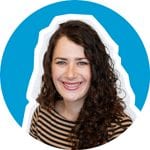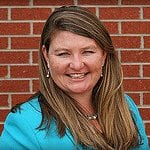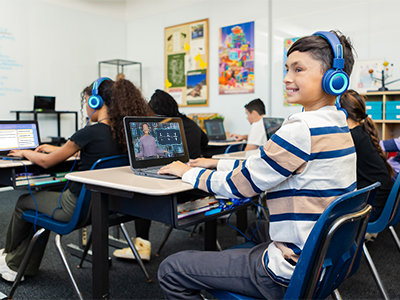Join live or receive a link to the recording and earn a CE certificate

- This event has passed.
Professional Learning Through Micro-credentials
Monday, September 24, 2018 @ 5:00 pm - 6:00 pm EDT

Presented by Jennifer Kabaker, Director of the Educator Micro-credentials Initiative, Digital Promise; Mary Ann Wolf, PhD, Director of Digital Learning Programs, Friday Institute for Educational Innovation, NC State University; and James Frye, Assistant Principal and STEM Coordinator, Newton-Conover STEM Middle School, Conover, NC
Hosted by Barbara Pape, Communications Director, Learner Positioning Systems, Digital Promise Global
Sponsored by Digital Promise
Micro-credentials are a natural extension of the formal and informal learning activities educators engage in every day. Digital Promise has built an ecosystem of micro-credentials in partnership with issuers, earners, and recognizers to personalize learning for educators. These micro-credentials are competency-based, on-demand, personalized, and shareable. They empower educators to drive their professional learning and give administrators the tools they need to personalize learning for their educators and meet their broader goals. Digital Promise is working with states, districts, schools, and educators to implement and build incentive structures for micro-credentials.
The Friday Institute has developed over 40 micro-credentials on a variety of topics, including strategies educators can use to support students with learning differences. The Friday Institute also embeds micro-credentials in various professional learning experiences such as through Massive Open Online Courses for Educators (MOOC-Eds) and face-to-face cohorts. Each micro-credential is:
- Self-directed. Educators can pursue the micro-credentials by participating in a MOOC-Ed, through other professional learning activities, or on their own
- Job-Embedded. Each of the micro-credentials is directly tied to classroom practice and provides a scaffold approach to building useful classroom skills
- Competency-Based. Micro-credentials measure an educator’s demonstrated ability to apply specific skills in the classroom context
- Research-Based. Micro-credentials are designed around skills that have been thoroughly researched and have a demonstrated import on classroom practice
In this edWebinar, the presenters will help viewers:
- Develop an understanding of micro-credentials and how they personalize learning for educators
- Take a closer look at the Friday Institute’s stack of micro-credentials that address learner variability
- Hear first-hand experience from a teacher who has earned a micro-credential
K-12 teachers, coaches, and state, district, and school leaders interested in micro-credentials as a professional development option will benefit from watching this recorded session.

Jennifer Kabaker is the director of the educator micro-credentials initiative at Digital Promise where she is leading the development of an ecosystem of micro-credentials to provide educators with recognition for the skills they learn throughout their careers. She comes to Digital Promise from KIPP LA Schools, a high-performing charter management organization in Los Angeles, where she managed corporate and foundation relationships and led external engagement efforts to ensure the schools and students have the tools they need to succeed. Previously, she worked at two Washington, D.C. think tanks, the New America Foundation and Urban Institute, researching and writing about federal education funding, policy, and reform. Jennifer received her master’s degree in policy, organizations, and leadership studies from the Stanford Graduate School of Education and graduated with honors from Stanford University with a bachelor’s degree in public policy with a focus in education.

Mary Ann recently co-wrote Leading Personalized and Digital Learning: A Framework for Implementing School Change through Harvard Education Press. She played a lead role in developing and facilitating the Digital Learning Transition MOOC-Ed and has led the development of the Learning Differences online course and micro-credentials. Mary Ann has written extensively on culture, personalized learning, and digital learning, including Innovate to Educate: Education System [Re]Design for Personalized Learning, an influential report based upon a symposium held by SIIA, ASCD, and CCSSO. She also co-authored Culture Shift: Teaching in a Learner-Centered Environment Powered by Digital Learning for the Alliance for Excellent Education and two reports on mobile learning in North America for UNESCO and CoSN.


Barbara Pape is the communications director for the Learner Positioning Systems (LPS) at Digital Promise Global (DPG). She has 20 years experience in strategic communications, writing, and policy analysis, primarily in education. Previously, she served as Executive Producer of the award-winning Teaching & Learning conference, sponsored by the National Board for Professional Teaching Standards, where she developed content and oversaw outreach and communications. As a writer, she has written for numerous publications, including Harvard University, the National Education Goals Panel (U.S. Department of Education) and Parents magazine. Barbara also served as editor and publisher of the first electronically delivered education newsletter, the Daily Report Card. She earned an EdM at Harvard University’s Graduate School of Education and launched her career as a middle school language arts teacher.
Join the Personalized Learning for All community to network with educators, participate in online discussions, receive invitations to upcoming edWebinars, and view past edWebinars to earn CE certificates.
edWeb members can download a personalized CE certificate from their edWeb member page. Not a member? Join here!

The fourth installment in Digital Promise Global’s Making Learning Personal For All series, Policies and Practices that Meet Learners Where They Are highlights the promise of personalized learning to meet the needs of the full diversity of learners. It also examines policy actions and investments that district, state, and federal and national levels can take to help each learner master content and a broad range of skills. It makes clear that personalization must consider the whole child, put learner voice and choice front and center, and be built on the learning sciences.


